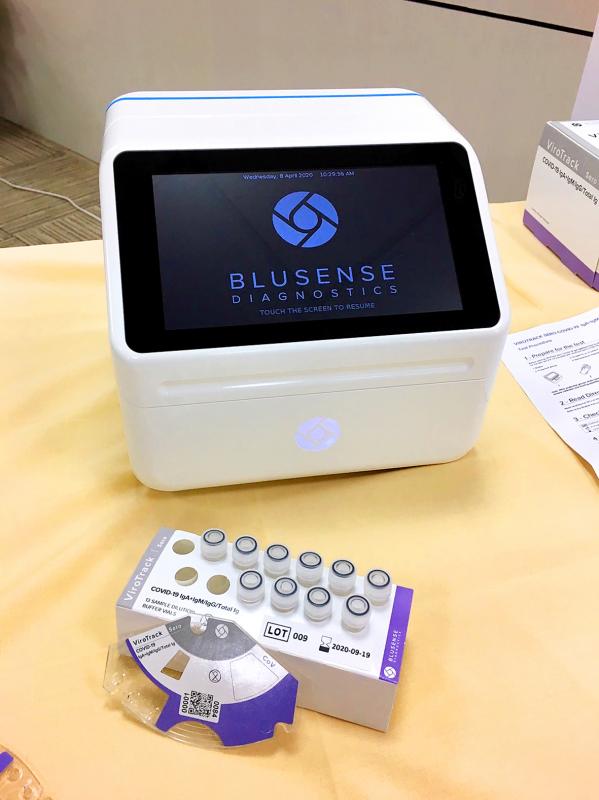Taiwanese-Danish firm BluSense Diagnostics has developed a device to diagnose COVID-19 with 90 percent certainty within 12 minutes using one drop of blood, and the EU next month could license it for use and it could be available in Taiwan by June.
Company president Filippo Bosco and executive vice president Jessie Sun (孫偉芸) yesterday demonstrated the machine at a news conference.
The device, no larger than an electronic blood pressure monitor, can detect immunoglobulins M and G, which are antibodies produced in the body in the early and mid-late stage of COVID-19 infection, Sun said.

Photo: Yang Mien-chieh, Taipei Times
As it is capable of producing results within 12 minutes, the machine could help detect whether patients are infected during the recovery period, screen local cluster infections, detect asymptomatic patients and screen those traveling abroad, she said.
It could also be used to verify whether patients should be cleared to leave the hospital, she added.
The machine last week underwent preliminary clinical tests at the Hvidovre Hospital near Copenhagen, Bosco said.
It has been able to identify whether the 15 subjects used in testing were positive or negative for the SARS-CoV-2, the virus that causes COVID-19, he said.
The company next week is looking to hold a larger-scale clinical trial — about 200 subjects — in Italy, Bosco said, adding that negotiations for conducting clinical trials in Taiwan are ongoing.
BluSense has previously developed diagnostic platforms for the Zika and dengue viruses, and the new platform had simply replaced the Zika and dengue virus antigen with a COVID-19 antigen, Sun said.
BluSense was established in 2014, with its equipment manufacturing and hardware development centers in Taoyuan’s Gueishan District (龜山), while its biochemistry research and development branch is in Copenhagen.
It received a US Agency for International Development grant in 2016 for developing ViroTrack, a rapid point of care diagnostics system using Blu-ray-based optical detection.

The manufacture of the remaining 28 M1A2T Abrams tanks Taiwan purchased from the US has recently been completed, and they are expected to be delivered within the next one to two months, a source said yesterday. The Ministry of National Defense is arranging cargo ships to transport the tanks to Taiwan as soon as possible, said the source, who is familiar with the matter. The estimated arrival time ranges from late this month to early next month, the source said. The 28 Abrams tanks make up the third and final batch of a total of 108 tanks, valued at about NT$40.5 billion

Two Taiwanese prosecutors were questioned by Chinese security personnel at their hotel during a trip to China’s Henan Province this month, the Mainland Affairs Council (MAC) said yesterday. The officers had personal information on the prosecutors, including “when they were assigned to their posts, their work locations and job titles,” MAC Deputy Minister and spokesman Liang Wen-chieh (梁文傑) said. On top of asking about their agencies and positions, the officers also questioned the prosecutors about the Cross-Strait Joint Crime-Fighting and Judicial Mutual Assistance Agreement, a pact that serves as the framework for Taiwan-China cooperation on combating crime and providing judicial assistance, Liang

A group from the Taiwanese Designers in Australia association yesterday represented Taiwan at the Midsumma Pride March in Melbourne. The march, held in the St. Kilda suburb, is the city’s largest LGBTQIA+ parade and the flagship event of the annual Midsumma Festival. It attracted more than 45,000 spectators who supported the 400 groups and 10,000 marchers that participated this year, the association said. Taiwanese Designers said they organized a team to march for Taiwan this year, joining politicians, government agencies, professionals and community organizations in showing support for LGBTQIA+ people and diverse communities. As the first country in Asia to legalize same-sex

MOTIVES QUESTIONED The PLA considers Xi’s policies toward Taiwan to be driven by personal considerations rather than military assessment, the Epoch Times reports Chinese President Xi Jinping’s (習近平) latest purge of the Chinese People’s Liberation Army (PLA) leadership might have been prompted by the military’s opposition to plans of invading Taiwan, the Epoch Times said. The Chinese military opposes waging war against Taiwan by a large consensus, putting it at odds with Xi’s vision, the Falun Gong-affiliated daily said in a report on Thursday, citing anonymous sources with insight into the PLA’s inner workings. The opposition is not the opinion of a few generals, but a widely shared view among the PLA cadre, the Epoch Times cited them as saying. “Chinese forces know full well that